一般过去时讲解与练习小学生(1)
(完整)小学英语一般过去时专项讲解、练习和参考答案
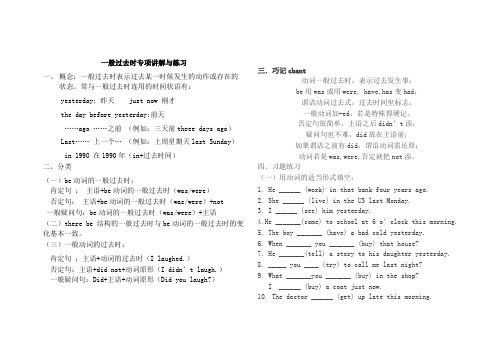
一般过去时专项讲解与练习一、概念:一般过去时表示过去某一时候发生的动作或存在的状态。
常与一般过去时连用的时间状语有:yesterday; 昨天 just now 刚才the day before yesterday;前天……ago ……之前(例如:三天前three days ago)Last…… 上一个… (例如:上周星期天last Sunday)in 1990 在1990年(in+过去时间)二、分类(一)be动词的一般过去时:肯定句:主语+be动词的一般过去时(was/were)否定句:主语+be动词的一般过去时(was/were)+not一般疑问句:be动词的一般过去时(was/were)+主语(二)there be 结构的一般过去时与be动词的一般过去时的变化基本一致。
(三)一般动词的过去时:肯定句:主语+动词的过去时(I laughed.)否定句:主语+did not+动词原形(I didn’t laugh.)一般疑问句:Did+主语+动词原形(Did you laugh?)三.巧记chant动词一般过去时,表示过去发生事;be用was或用were, have,has变had;谓语动词过去式,过去时间坐标志;一般动词加-ed,若是特殊得硬记。
否定句很简单,主语之后didn’t添;疑问句也不难,did放在主语前;如果谓语之前有did,谓语动词需还原;动词若是was,were,否定就把not添。
四、习题练习(一)用动词的适当形式填空:1. He ______ (work) in that bank four years ago.2. She ______ (live) in the US last Monday.3. I ______ (see) him yesterday.4.He _______(come) to school at 6 o’clock this morning.5. The boy _______ (have) a bad cold yesterday.6. When _______ you _______ (buy) that house?7. He _______(tell) a story to his daughter yesterday.8. _____ you ____ (try) to call me last night?9. What _______you _______ (buy) in the shop?I ______ (buy) a coat just now.10. The doctor ______ (get) up late this morning.11. She ________ (paint) the wall last month.12. My mother _______ (be) a worker 20 years ago.13. ________ (be) you here just now?No, I ________ (be not) here.14. Why _______ your brother _______ (cry) last night?15. It ______(be) my mother’s birthday yesterday.(二)翻译下列句子:1.我上周去看爷爷和奶奶了。
小学一般过去时详细讲解与练习

一般过去时详细讲解与练习题一、巧记一般过去时:动词一般过去时,表示过去发生的事;be 用was 或用were,have,has 变had ; 谓语动词过去式,过去时间作标志;一般动词加-ed ,若是特殊得硬记。
否定句很简单,主语之后didn’t 添;疑问句也不难,did 放在主语前;不含be 动词时如果谓语之前有did ,谓语动词需还原;动词若是was,were,否定就把not 添。
含be 动词时疑问句也不难,要把was ,were 放在主语前。
二、be 的一般过去时:学习动词be 的一般过去时,下面有一口诀,它可以帮你们更好地掌 握动词be 的一般过去时。
be 的过去时有四巧: 一是时间状语巧,表示过去的短语要记牢; 二是形式巧,单数was ,复数were ; 三巧是否定句结构,not 紧跟was /were ; 四是疑问句式巧,was /were 向前跑(提前)。
【一巧】时间状语(即标志词)巧。
一般过去时表示过去发生的动作或存在的状态,恰巧 与表示过去的一些时间状语连用。
【二巧】形式巧。
它与一般现在时一样,形式多样:当主语是第一人称单数或第三人称单 数时,谓语动词用was ;主语是第二人称或其他人称复数时,谓语动词用were 。
例如:Iwasintheclassroomyesterdaymorning .昨天早上我在教室里。
HewasatschoollastTuesday .上周二他在学校。
Theywereoverthereamomentago .刚才他们在那边。
【三巧】否定句结构巧。
与动词be 的一般现在时一样,它在动词后面加not 即可变成否定 句,并且was,were 与not 可以缩写成wasn't,weren't 。
即: 主语+wasn't /weren't +表语+其他。
例如:Iwasnot(=wasn't)hereyesterday .昨天我不在这儿。
一般过去式专项讲解与练习
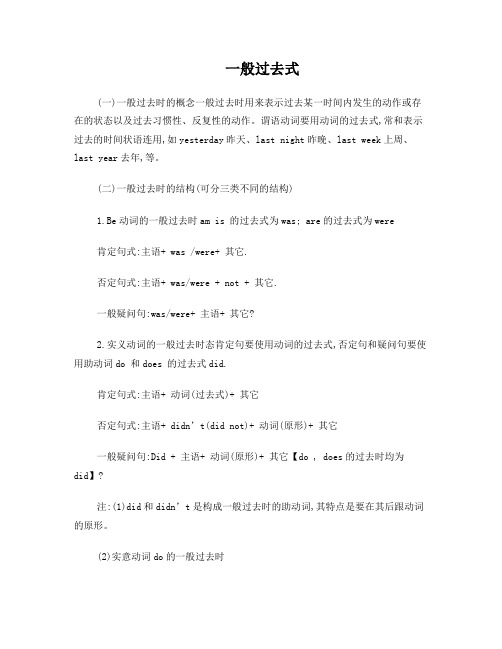
一般过去式(一)一般过去时的概念一般过去时用来表示过去某一时间内发生的动作或存在的状态以及过去习惯性、反复性的动作。
谓语动词要用动词的过去式,常和表示过去的时间状语连用,如yesterday昨天、last night昨晚、last week上周、last year去年,等。
(二)一般过去时的结构(可分三类不同的结构)1.Be动词的一般过去时am is 的过去式为was; are的过去式为were肯定句式:主语+ was /were+ 其它.否定句式:主语+ was/were + not + 其它.一般疑问句:was/were+ 主语+ 其它?2.实义动词的一般过去时态肯定句要使用动词的过去式,否定句和疑问句要使用助动词do 和does 的过去式did.肯定句式:主语+ 动词(过去式)+ 其它否定句式:主语+ didn’t(did not)+ 动词(原形)+ 其它一般疑问句:Did + 主语+ 动词(原形)+ 其它【do , does的过去时均为did】?注:(1)did和didn’t是构成一般过去时的助动词,其特点是要在其后跟动词的原形。
(2)实意动词do的一般过去时I do my homework every day.(用yesterday改写句子)I did my homework yesterday.I didn’t do my homework yesterday.(否定句)Did you doyour homework yesterday?Yes ,I did. /No, I didn’t.(一般疑问句)3. 情态动词的一般过去时态肯定句式:主语+ 情态动词+ 其它否定句式:主语+ 情态动词+ not + 其它.一般疑问句:情态动词+ 主语+ 其它?注:情态动词的过去式:can→could , may→might , must→must ,will-would,should-should。
(完整版)小学地理一般过去时讲解及练习
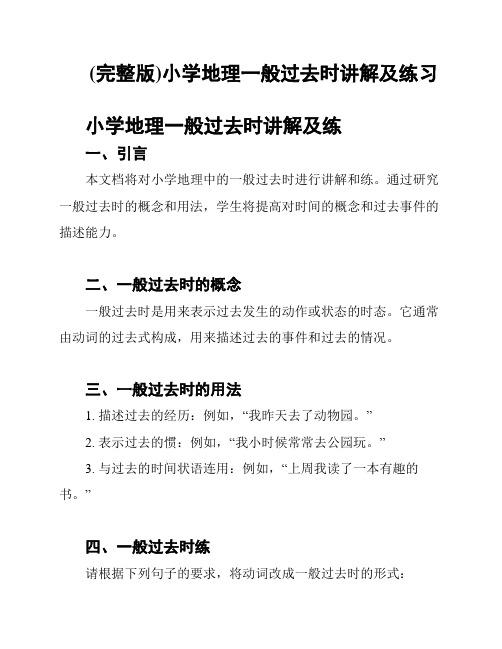
(完整版)小学地理一般过去时讲解及练习
小学地理一般过去时讲解及练
一、引言
本文档将对小学地理中的一般过去时进行讲解和练。
通过研究一般过去时的概念和用法,学生将提高对时间的概念和过去事件的描述能力。
二、一般过去时的概念
一般过去时是用来表示过去发生的动作或状态的时态。
它通常由动词的过去式构成,用来描述过去的事件和过去的情况。
三、一般过去时的用法
1. 描述过去的经历:例如,“我昨天去了动物园。
”
2. 表示过去的惯:例如,“我小时候常常去公园玩。
”
3. 与过去的时间状语连用:例如,“上周我读了一本有趣的书。
”
四、一般过去时练
请根据下列句子的要求,将动词改成一般过去时的形式:
1. 我们在学校里玩。
改成一般过去时:我们在学校里___(玩)。
2. 昨天我看见了一只小鸟。
改成一般过去时:昨天我___(看见)了一只小鸟。
3. 她经常去公园散步。
改成一般过去时:她常常去公园___(散步)。
4. 我们昨天去了海边游泳。
改成一般过去时:我们昨天___(去)了海边___(游泳)。
5. 上个月我们去了北京旅行。
改成一般过去时:___(上个月)我们___(去)了北京___(旅行)。
五、总结
通过本文档的讲解和练习,学生们应该对一般过去时有了更深入的了解。
通过不断的练习和运用,他们将能够熟练地运用一般过去时来描述过去的事件和情况。
小学一般过去时入门详解与练习

小学一般过去时入门详解与练习大童的英语启蒙需要学习的计划性,家长要和孩子商量着选材,并列一张详细的阅读计划,包括读、听的时长、具体做法以及阶段成效等。
小偏整理了小学一般过去时入门详解与练习,欢迎参考借鉴。
小学一般过去时入门详解与练习一、定义:表示在的过去某个时间里所发生的动作或存在的状态。
二、构成:主语 + 动词的一般过去式 + 其他1、在表示某个时间里存在的状态的句子,系动词用过式was,were构成。
如:eg:I was at home yesterday. 昨天我在家。
2、在表示过去某个时间里发生的动作,用动词的过去式构成。
如:I visited my uncle yesterday. 昨天我拜访了我的叔叔。
3.各种句式(1)一般过去时的肯定陈述句:主语 + 动词过去式 + 宾语或表语。
He worked in Shanghai ten years ago.(2)一般过去时的否定句:a.主语+ didn’t + 动词原形 + 宾语。
(did + not = didn't)He didn't do morning exercises yesterday.b.主语+ wasn’t/weren’t +表语。
(was + not = wasn't , were + not = weren't)He wasn't an English teacher ten years ago.(3)一般过去时的一般疑问句:a.Did + 主语 + 动词原形 + 宾语 ?Did you study English in 1990 ?b.Was/Were + 主语 + 表语 ?Was he a pupil five years ago ?(4)一般过去时的特殊疑问句:a.特殊疑问词 + did + 主语 + 动词原形 + 宾语?Where did your parents live five years ago?What did you do last Sunday?b.特殊疑问词 + were/was + 表语?Who was at the zoo yesterday?三、标志词:yesterday 昨天 (yesterday+时间 last+时间)ago 之前before 在….之前the day before yesterday 前天just now 刚才in+时间(in 1990)......四:动词的一般过去时变化规律:⑴ 一般情况直接在词尾加+ ed,如:cook-cooked wash-washed⑵ 以不发音的e 结尾的动词,在词尾+ d如: like-liked live-lived⑶ 以重读闭音节结尾的动词,双写最后一个字母再在词尾+ed如:stop-stopped shop-shopped plan-planned 计划⑷ 以辅音字母+y 结尾的动词,要改y 为 i 再加 ed如:study-studied carry- carried 运送,搬运另外须记不规则动词的一般过去时变形。
小学科学一般过去时专项讲解、练习和参考答案

小学科学一般过去时专项讲解、练习和参考答案1. 专项讲解1.1 什么是一般过去时?一般过去时是英语中表示过去发生的动作、事件或状态的时间形式。
它通常与过去的时间状语连用,例如"yesterday"(昨天)、"last week"(上周)等。
1.2 一般过去时的构成一般过去时的构成有两种情况:1. 对于大部分动词,直接在动词后面加上"-ed"形成过去式,例如:- play(玩)→ played(玩过)- walk(走)→ walked(走过)- jump(跳)→ jumped(跳过)2. 对于以字母"e"结尾的动词,只需在动词后面加上"d"形成过去式,例如:- dance(跳舞)→ danced(跳过舞)- smile(微笑)→ smiled(微笑过)- arrive(到达)→ arrived(到达过)1.3 一般过去时的用法一般过去时用来描述过去发生的动作、事件或状态。
例如:- I played football with my friends yesterday.(昨天我和我的朋友们一起踢足球。
)- She walked to school last week.(上周她走路去学校。
)- We watched a movie together.(我们一起看电影了。
)2. 练2.1 根据所给动词的过去式填空1. I __________ (finish) my homework last night.2. He __________ (visit) his grandparents yesterday.3. They __________ (play) basketball in the park this morning.2.2 根据句意选择适当的动词形式1. My sister __________ (paint / painted) a beautiful picture yesterday.2. We __________ (watch / watched) a movie together last weekend.3. The cat __________ (jump / jumped) off the table.3. 参考答案3.1 专项讲解略3.2 练2.1 答案:1. finished2. visited3. played2.2 答案:1. painted2. watched3. jumped以上是小学科学一般过去时专项讲解、练习和参考答案的完整版。
一般过去时讲解与练习小学生

一般过去时讲解与练习1.一般过去时表示过去某个时间发生的动作或存在的状态,常和表示过去的时间状语连用。
一般过去时也表示过去经常或反复发生的动作。
2.Be动词在一般过去时中的变化:⑴am 和is在一般过去时中变为was。
(was not=wasn’t)⑵are在一般过去时中变为were。
(were not=weren't)⑶带有was或were的句子,其否定、疑问的变化和is,am, are一样,即否定句在was或were后加not,一般疑问句把was或were 调到句首.3.句中没有be动词的一般过去时的句子否定句:didn’t +动词原形,如:Jim didn’t go home yesterday.一般疑问句:在句首加did,句子中的动词过去式变回原形。
如:Did Jim go home yesterday?特殊疑问句:⑴疑问词+did+主语+动词原形?如:What did Jim do yesterday?⑵疑问词当主语时:疑问词+动词过去式?如:Who went to home yesterday?动词过去式变化规则:1.一般在动词末尾加-ed,如:play—played,cook—cooked 2.结尾是e加d,如:taste-tasted3.末尾只有一个元音字母和一个辅音字母的重读闭音节,应双写末尾的辅音字母,再加—ed,如:stop-stopped4.以“辅音字母+y”结尾的,变y为i,再加—ed,如:study-studied 5.小学常用不规则动词过去式:am,is-was, are-were, do-did, see-saw,say—said,give-gave,get—got,go-went, come-came, have—had,eat-ate,take—took, run—ran, sing—sang, put—put, make—made,read—read, write—wrote,draw-drew, drink—drank, fly-flew,ride-rode,speak—spoke,sweep-swept,swim—swam,sit-sat一.用be动词的适当形式填空1。
小学英语一般过去时讲解及练习题

小学英语一般过去时讲解及练习题一般过去时简介一般过去时是英语中用来描述过去发生的动作或状态的一种时态。
当我们谈论过去发生的事情时,通常会使用一般过去时。
一般过去时的动词形式是在动词的原形后面加上-ed。
但是也有一些不规则动词需要记忆其过去时的形式。
一般过去时的用法一般过去时用于以下情况:- 表示过去某个时间发生的动作或状态。
例如:I watched a movie yesterday.(昨天我看了一部电影。
)- 描述过去经常发生的动作或状态。
例如:She always wore a red dress to parties.(她过去总是穿红色裙子去参加派对。
)- 表示过去的条件句。
例如:If it rained, we stayed indoors.(如果下雨了,我们就呆在室内。
)一般过去时的句式一般过去时的句式包括肯定句、否定句和疑问句。
下面分别介绍一下这三种句式的构成。
肯定句肯定句的构成很简单,只需要在动词后面加上-ed。
例如:I played soccer with my friends yesterday.(昨天我和朋友们一起踢足球。
)否定句构成否定句需要在动词前面加上助动词did和not。
例如:I did not watch TV last night.(昨晚我没有看电视。
)疑问句构成疑问句需要将助动词did放在句首,后面跟主语,然后加上动词原形。
例如:Did you eat breakfast this morning?(你今天早上吃早餐了吗?)练题请完成以下练题,用一般过去时填空。
1. They __________ (go) to the park yesterday.2. We __________ (play) soccer last weekend.3. She __________ (not watch) the movie with us.4. Did you __________ (see) the fireworks last night?答案:1. went2. played3. did not watch4. see。
一般过去时讲解及练习
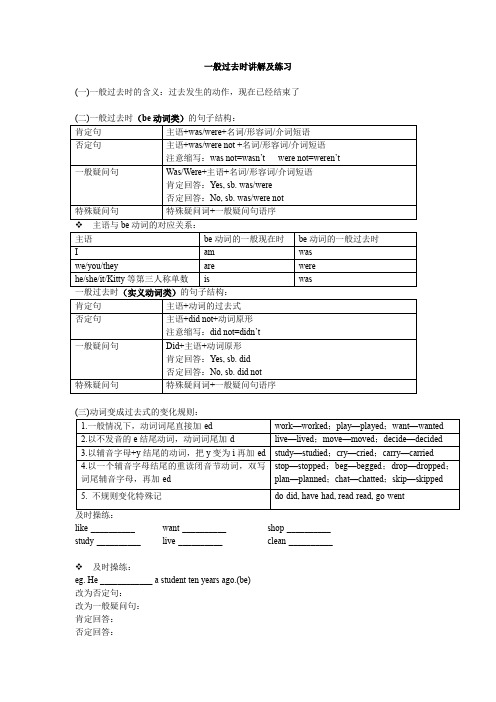
一般过去时讲解及练习(一)一般过去时的含义:过去发生的动作,现在已经结束了一般过去时(实义动词类)的句子结构:及时操练:like-__________want-__________shop-__________ study-__________live-__________clean-__________❖及时操练:eg. He ____________ a student ten years ago.(be)改为否定句:改为一般疑问句:肯定回答:否定回答:对ten years ago划线提问:(四)一般过去时的时间标志词1. yesterday昨天系列:yesterday昨天,yesterday morning昨天早上,the day before yesterday 前天2. last上一个系列:last year去年,last month上个月,last week上周3. ago以前系列:two minutes ago两分钟前, three hours ago三小时前, four days ago四天前4. just now刚才(五)一般过去时(be动词类)练习:I. 用所给词的适当形式填空1. I __________ at home just now. (be)2. They __________ happy last week. (be)3. She __________ a student ten years ago. (be)4. The old man __________ at church yesterday. (be)II. 按要求改写句子:1. I was at home just now. (改成否定句)I __________ __________ at home just now.2. They were happy last week. (改成一般疑问句)__________ __________ happy last week?3. She was a student ten years ago. (改成否定句)She __________ __________ a student ten years ago.4. The old man was at church yesterday. (对划线部分提问)__________ __________ the old man at church ?(七)一般过去时(实义动词类)练习:I. 用所给词的适当形式填空1. I _________ (have) an exciting party last weekend.2. _________ she _________(practice) her guitar yesterday? No, she _________.3. What ________ Tom ________ (do) on Saturday evening?He ________(watch) TV and __________(read) an interesting book.4. They all _________(go) to the mountains yesterday morning.5. She _________(not visit) her aunt last weekend.She ________ (stay) at home and _________(do) some cleaning.II. 按要求改写句子1. Lucy did her homework at home.(改否定句)Lucy ________ _______ her homework at home.2. He found some meat in the fridge.(变一般疑问句)___________ he __________ ___________ meat in the fridge?3. They studied English last year.(变一般疑问句)_______ they _______ English last year?4. Frank read an interesting book about history. (一般疑问句)_______ Frank _______ an interesting book about history?5. My family went to the beach last week. (划线提问)________ ________ ________ family _______ last week?。
小学英语过去式讲解(附练习及答案)
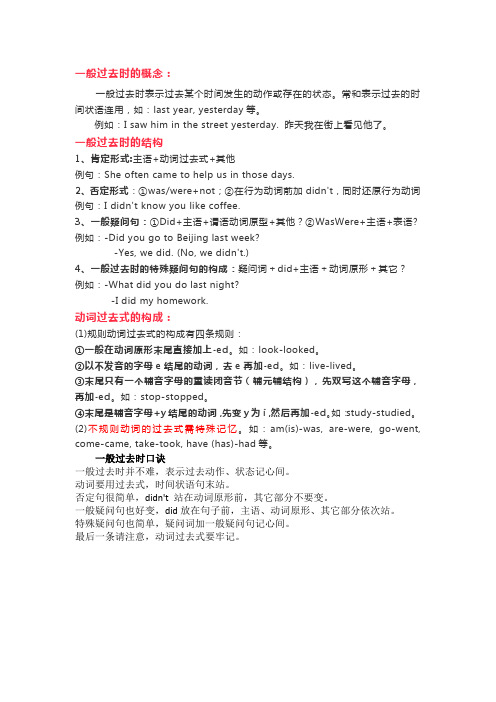
一般过去时的概念:一般过去时表示过去某个时间发生的动作或存在的状态。
常和表示过去的时间状语连用,如:last year, yesterday等。
例如:I saw him in the street yesterday. 昨天我在街上看见他了。
一般过去时的结构1、肯定形式:主语+动词过去式+其他例句:She often came to help us in those days.2、否定形式:①was/were+not;②在行为动词前加didn't,同时还原行为动词例句:I didn't know you like coffee.3、一般疑问句:①Did+主语+谓语动词原型+其他?②WasWere+主语+表语?例如:-Did you go to Beijing last week?-Yes, we did. (No, we didn't.)4、一般过去时的特殊疑问句的构成:疑问词+did+主语+动词原形+其它?例如:-What did you do last night?-I did my homework.动词过去式的构成:(1)规则动词过去式的构成有四条规则:①一般在动词原形末尾直接加上-ed。
如:look-looked。
②以不发音的字母e结尾的动词,去e再加-ed。
如:live-lived。
③末尾只有一个辅音字母的重读闭音节(辅元辅结构),先双写这个辅音字母,再加-ed。
如:stop-stopped。
④末尾是辅音字母+y结尾的动词,先变y为i,然后再加-ed。
如:study-studied。
(2)不规则动词的过去式需特殊记忆。
如:am(is)-was, are-were, go-went, come-came, take-took, have (has)-had等。
一般过去时口诀一般过去时并不难,表示过去动作、状态记心间。
动词要用过去式,时间状语句末站。
否定句很简单,didn't 站在动词原形前,其它部分不要变。
(完整版)小学生活技能一般过去时讲解及练习

(完整版)小学生活技能一般过去时讲解及练习小学生活技能一般过去时讲解及练一般过去时简介一般过去时用于描述在过去发生的动作、状态或惯。
在这个时态中,动词通常要加上过去时态的形式。
对于规则动词,一般过去时的构成是在动词原形后面加上-ed。
对于不规则动词,需要根据其变化规则进行相应的变化。
一般过去时的用法表示过去的动作或事件例:- I watched a movie yesterday.(昨天我看了一部电影。
)- She ate breakfast at 8 o'clock.(她八点钟吃早饭了。
)表示过去的状态或惯例:- We lived in that house for five years.(我们在那个房子里住了五年。
)- He always played soccer on weekends.(他总是在周末踢足球。
)一般过去时的练请根据以下句子,填写合适的动词形式,完成一般过去时的练。
1. I ________ (visit) my grandparents last weekend.2. She ________ (clean) her room yesterday.3. They ________ (play) soccer in the park.4. He ________ (watch) a movie with his friends.5. We ________ (have) a delicious dinner at the restaurant.1. visited2. cleaned3. played4. watched5. had请注意,在一般过去时的练中,动词需要根据句子的主语和动作进行相应的变化,即加上过去时态的形式。
希望以上内容对你学习小学生活技能一般过去时有所帮助!。
小学一般过去时详细讲解与练习
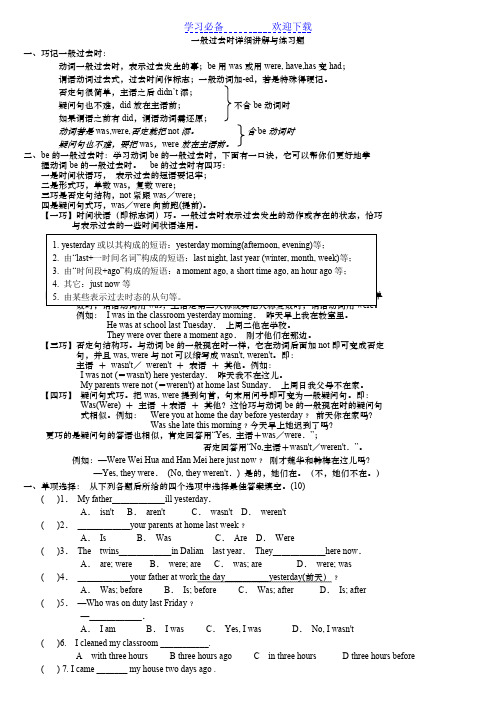
一般过去时详细讲解与练习题一、巧记一般过去时:动词一般过去时,表示过去发生的事;be 用was 或用were, have,has 变had ; 谓语动词过去式,过去时间作标志;一般动词加-ed ,若是特殊得硬记。
否定句很简单,主语之后didn’t 添;疑问句也不难,did 放在主语前; 不含be 动词时如果谓语之前有did ,谓语动词需还原;动词若是was,were,否定就把not 添。
含be 动词时疑问句也不难,要把was ,were 放在主语前。
二、be 的一般过去时:学习动词be 的一般过去时,下面有一口诀,它可以帮你们更好地掌握动词be 的一般过去时。
be 的过去时有四巧:一是时间状语巧, 表示过去的短语要记牢;二是形式巧,单数was ,复数were ;三巧是否定句结构,not 紧跟was /were ;四是疑问句式巧,was /were 向前跑(提前)。
【一巧】时间状语(即标志词)巧。
一般过去时表示过去发生的动作或存在的状态,恰巧与表示过去的一些时间状语连用。
【二巧】形式巧。
它与一般现在时一样,形式多样:当主语是第一人称单数或第三人称单 数时,谓语动词用was ;主语是第二人称或其他人称复数时,谓语动词用were 。
例如: I was in the classroom yesterday morning . 昨天早上我在教室里。
He was at school last Tuesday . 上周二他在学校。
They were over there a moment ago . 刚才他们在那边。
【三巧】否定句结构巧。
与动词be 的一般现在时一样,它在动词后面加not 即可变成否定句,并且was, were 与not 可以缩写成wasn't, weren't 。
即:主语 + wasn't / weren't + 表语 + 其他。
例如:I was not (=wasn't) here yesterday . 昨天我不在这儿。
一般过去时的讲解及练习
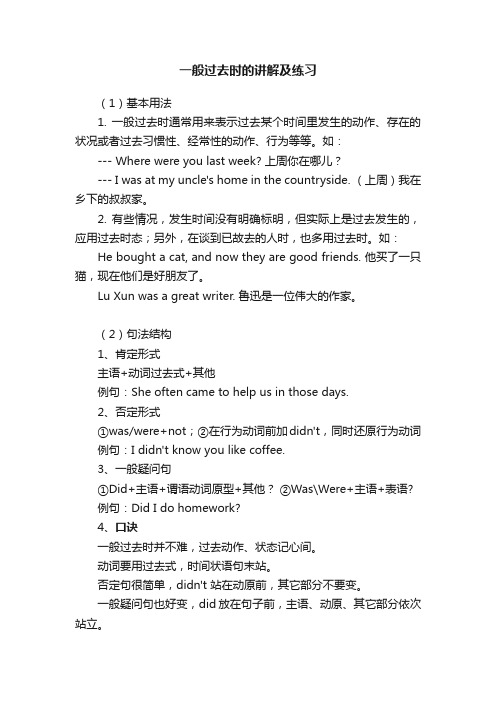
一般过去时的讲解及练习(1)基本用法1. 一般过去时通常用来表示过去某个时间里发生的动作、存在的状况或者过去习惯性、经常性的动作、行为等等。
如:--- Where were you last week? 上周你在哪儿?--- I was at my uncle's home in the countryside. (上周)我在乡下的叔叔家。
2. 有些情况,发生时间没有明确标明,但实际上是过去发生的,应用过去时态;另外,在谈到已故去的人时,也多用过去时。
如:He bought a cat, and now they are good friends. 他买了一只猫,现在他们是好朋友了。
Lu Xun was a great writer. 鲁迅是一位伟大的作家。
(2)句法结构1、肯定形式主语+动词过去式+其他例句:She often came to help us in those days.2、否定形式①was/were+not;②在行为动词前加didn't,同时还原行为动词例句:I didn't know you like coffee.3、一般疑问句①Did+主语+谓语动词原型+其他?②Was\Were+主语+表语?例句:Did I do homework?4、口诀一般过去时并不难,过去动作、状态记心间。
动词要用过去式,时间状语句末站。
否定句很简单,didn't 站在动原前,其它部分不要变。
一般疑问句也好变,did放在句子前,主语、动原、其它部分依次站立。
特殊疑问句也简单,疑问词加一般疑问句记心间。
最后一条请注意,动词过去式要牢记!(3)时间状语与一般过去时连用的时间状语有:yesterday(昨天), last night (昨晚), last week(上个星期), four days ago(四天前), in 2002(在2002年), just now(刚才), the day before yesterday(前天)等。
(完整版)小学历史一般过去时讲解及练习
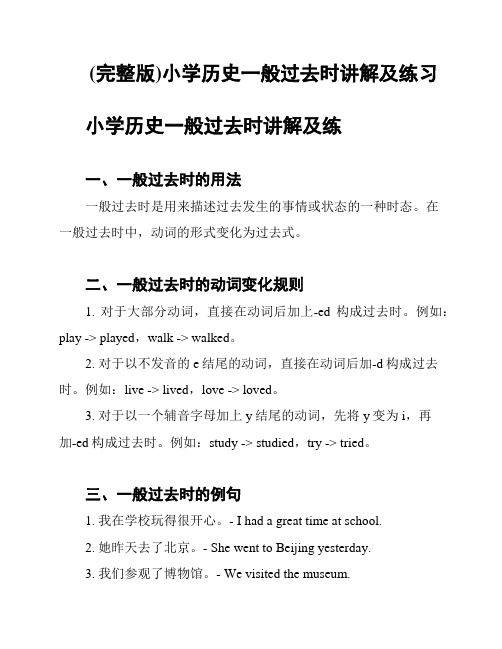
(完整版)小学历史一般过去时讲解及练习小学历史一般过去时讲解及练一、一般过去时的用法一般过去时是用来描述过去发生的事情或状态的一种时态。
在一般过去时中,动词的形式变化为过去式。
二、一般过去时的动词变化规则1. 对于大部分动词,直接在动词后加上-ed构成过去时。
例如:play -> played,walk -> walked。
2. 对于以不发音的e结尾的动词,直接在动词后加-d构成过去时。
例如:live -> lived,love -> loved。
3. 对于以一个辅音字母加上y结尾的动词,先将y变为i,再加-ed构成过去时。
例如:study -> studied,try -> tried。
三、一般过去时的例句1. 我在学校玩得很开心。
- I had a great time at school.2. 她昨天去了北京。
- She went to Beijing yesterday.3. 我们参观了博物馆。
- We visited the museum.4. 他们昨晚没看电影。
- They didn't watch a movie last night.5. 昨天是我的生日。
- Yesterday was my birthday.四、练题请根据下面的句子,使用合适的动词形式填空,完成句子。
1. She ___ (eat) dinner at home last night.2. We ___ (visit) the zoo yesterday.3. They ___ (play) soccer in the park.4. He ___ (watch) a movie with his friends.5. I ___ (study) for the test all night.答案:1. ate2. visited3. played4. watched5. studied以上就是小学历史一般过去时的讲解及练习。
(完整版)小学地理一般过去时讲解及练习
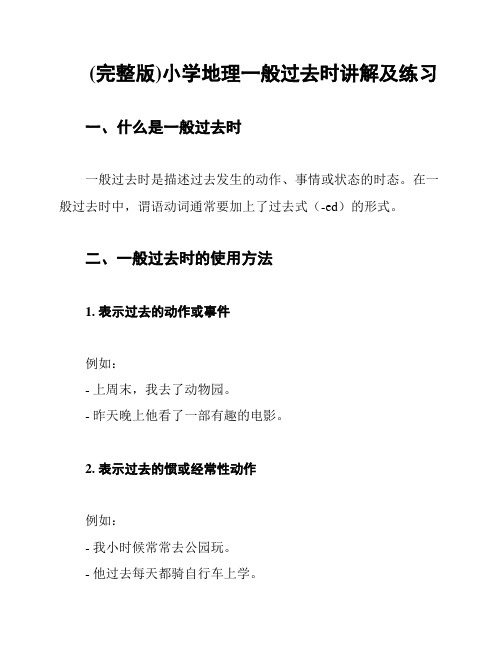
(完整版)小学地理一般过去时讲解及练习一、什么是一般过去时一般过去时是描述过去发生的动作、事情或状态的时态。
在一般过去时中,谓语动词通常要加上了过去式(-ed)的形式。
二、一般过去时的使用方法1. 表示过去的动作或事件例如:- 上周末,我去了动物园。
- 昨天晚上他看了一部有趣的电影。
2. 表示过去的惯或经常性动作例如:- 我小时候常常去公园玩。
- 他过去每天都骑自行车上学。
3. 表示过去的状态或条件例如:- 他以前是个优秀的学生。
- 我们过去住在一个小村庄里。
三、一般过去时的构成方式一般过去时的肯定句构成方式为:主语 + 过去式谓语动词 + 其他成分。
例如:- They played baseball in the park.(他们在公园里打棒球。
)一般过去时的否定句构成方式为:主语 + did not + 原形动词 + 其他成分。
例如:- She did not watch TV last night.(她昨晚没有看电视。
)一般过去时的疑问句构成方式为:Did + 主语 + 原形动词 + 其他成分?例如:- Did he go to the zoo?(他去动物园了吗?)四、一般过去时的练题请根据下面的句子,选择正确的动词形式填入空格中。
1. We ____(play/played) tennis last Sunday.2. I ____(visit/visited) my grandparents yesterday.3. The cat ____(sleep/slept) all day yesterday.4. She ____(go/went) to the beach with her friends.5. They ____(watch/watched) a movie at the cinema last night.答案:1. played2. visited3. slept4. went5. watched注意:以上为简单练,供参考使用。
一般过去时知识点及练习
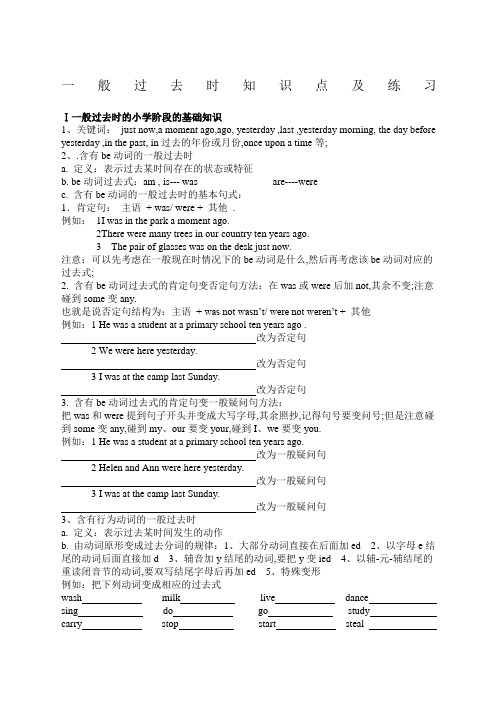
一般过去时知识点及练习Ⅰ一般过去时的小学阶段的基础知识1、关键词:just now,a moment ago,ago, yesterday ,last ,yesterday morning, the day before yesterday ,in the past, in过去的年份或月份,once upon a time等;2、.含有be动词的一般过去时a. 定义:表示过去某时间存在的状态或特征b. be动词过去式:am , is--- was are----werec. 含有be动词的一般过去时的基本句式:1.肯定句:主语+ was/ were + 其他.例如:1I was in the park a moment ago.2There were many trees in our country ten years ago.3 The pair of glasses was on the desk just now.注意:可以先考虑在一般现在时情况下的be动词是什么,然后再考虑该be动词对应的过去式;2. 含有be动词过去式的肯定句变否定句方法:在was或were后加not,其余不变;注意碰到some变any.也就是说否定句结构为:主语+ was not wasn’t/ were not weren’t + 其他例如:1 He was a student at a primary school ten years ago .改为否定句2 We were here yesterday.改为否定句3 I was at the camp last Sunday.改为否定句3. 含有be动词过去式的肯定句变一般疑问句方法:把was和were提到句子开头并变成大写字母,其余照抄,记得句号要变问号;但是注意碰到some变any,碰到my、our要变your,碰到I、we要变you.例如:1 He was a student at a primary school ten years ago.改为一般疑问句2 Helen and Ann were here yesterday.改为一般疑问句3 I was at the camp last Sunday.改为一般疑问句3、含有行为动词的一般过去时a. 定义:表示过去某时间发生的动作b. 由动词原形变成过去分词的规律:1、大部分动词直接在后面加ed 2、以字母e结尾的动词后面直接加d 3、辅音加y结尾的动词,要把y变ied 4、以辅-元-辅结尾的重读闭音节的动词,要双写结尾字母后再加ed 5、特殊变形例如:把下列动词变成相应的过去式wash milk live dancesing do go studycarry stop start stealc.含有行为动词过去式的肯定句变否定句方法:用didn’t来帮忙,后面跟动词原形;所以否定句的结构为:主语+didn’tdid not+动词原形+其他;注意碰到some变any.提示:在否定句中,不管是don’t, doesn’t或didn’t后面统统跟动词原形;例如:I did my homework yesterday evening.改为否定句My sister ate some pies just now.改为否定句We lived in Nanjing last year.改为否定句d. 含有行为动词过去式的肯定句变一般疑问句方法:用did来帮忙并放在句子开头且大写,但是过去式要恢复成动词原形,最后句号变问号;所以一般疑问句的结构为:Did+主语+动词原形+其他注意碰到some变any,碰到my、our要变your,碰到I、we要变you. 例如:I did my homework yesterday evening.改为一般疑问句My sister ate some pies just now.改为一般疑问句We lived in Nanjing last year.改为一般疑问句Ⅱ一般过去时的拓展知识初中1、特殊变形的过去式begin—began blow---blew buy---bought catch---caughtcome---came do/does---did draw---drew drink---drankdrive---drove drink---drank drive—drove eat---atefeel---felt find---found fly---flew forget---forgotget---got give---gave go—went grow---grewhave---had hear---heard hurt---hurt keep---keptknow---knew learn---learnt/learned let---let lie----laymake---made mean---meant meet---met put---putread---read ride---rode ring---rang run---ransay---said see---saw show---showed/shown sing---sangsit---sat sleep---slept speak---spoke spend---spentstand---stood steal---stole swim---swam take---tookteach---taught tell---told think---thought throw---threwunderstand---understood wear---wore win---won write---wrote2、表示过去的习惯或经常发生的动作,过去常常做某事:used to do sth例如:I used to swim in the river when I was young.课堂练习基础篇一、用所给词的适当形式填空1. Last week, my father be ill at home.2. Jim jog now. He jog every day last week.3. My mother usually do housework every day.But she do housework today.4. Last Friday, I take part in a sports meeting .5.--- he eatany ice creams last Sunday---No, he二、按要求改写句型1、Betty saw Daming in the library yesterday afternoon.改为否定句改为一般疑问句作肯定和否定回答2、I was in the library a moment ago.改为否定句改为一般疑问句作肯定和否定回答提高篇1.—Where were you last Saturday —I ____ in the Capital Museum.A. amB. will beC. wasD. have been2. Lucy ______ a student last year, but now she ______ a teacher.A. is; isB. was;isC. was;will beD. is;was3. He ______ go out with his parents, but now he ______ staying at home alone.A. used to;is used tB. is used to;used toC. use to;is used to4.—I’v just got a new MP4.—Where _____ you ____it—In a shopping mall near here.A. have; boughtB. did; buyC. are; boughtD. were; getting5. There ______ some flowers on the teacher’s des k just now, but now there______nothing on it.A. have; hasB.were; wasC. were; isD.has; has课后练习一、写出下列动词的过去式is\am_________ fly_______ plant________ are ________ drink_________play_______ go________ make ________ does_________ dance________ worry________ ask _____ taste_________ eat__________ draw________二、用所给词的适当形式填空1. They _______ glad to see each other last month.2. Today _____ the second of June. Yesterday ______ the first of June. It _____ Children's Day. All the students ______ very excited.3. I ______ watch a cartoon on Saturday.4. Her father _______ read a newspaper now. He always read one in the evening.5. We _________ to zoo yesterday, we _____ to the park. go三、句型变换1. There was a car in front of the house just now.否定句:__________________________________________________________一般疑问句:__________________________________________________________肯定回答和否定回答:___________________________________________2. They played football in the playground.否定句:__________________________________________________________一般疑问句:__________________________________________________________肯定回答和否定回答:________________________________挑战自我完成短文I _______get up at 2 a.m. and ________hear someone shouting. I _______ jump out of bed and _____ run to the kitchen. I ______ see nothing there: it was dark and quiet. I _________ run to the living room. The television ______ be still on. I ______forget to turn it off before I ________ go to bed last night.。
- 1、下载文档前请自行甄别文档内容的完整性,平台不提供额外的编辑、内容补充、找答案等附加服务。
- 2、"仅部分预览"的文档,不可在线预览部分如存在完整性等问题,可反馈申请退款(可完整预览的文档不适用该条件!)。
- 3、如文档侵犯您的权益,请联系客服反馈,我们会尽快为您处理(人工客服工作时间:9:00-18:30)。
一般过去时讲解与练习1.一般过去时表示过去某个时间发生的动作或存在的状态,常和表示过去的时间状语连用。
一般过去时也表示过去经常或反复发生的动作。
2.Be动词在一般过去时中的变化:⑴am 和is在一般过去时中变为was。
(was not=wasn’t)⑵are在一般过去时中变为were。
(were not=weren’t)⑶带有was或were的句子,其否定、疑问的变化和is, am, are一样,即否定句在was 或were后加not,一般疑问句把was或were调到句首。
3.句中没有be动词的一般过去时的句子否定句:didn’t +动词原形,如:Jim didn’t go home yesterday.一般疑问句:在句首加did,句子中的动词过去式变回原形。
如:Did Jim go home yesterday?特殊疑问句:⑴疑问词+did+主语+动词原形?如:What did Jim do yesterday? ⑵疑问词当主语时:疑问词+动词过去式?如:Who went to home yesterday?动词过去式变化规则:1.一般在动词末尾加-ed,如:play-played, cook-cooked2.结尾是e加d,如:taste-tasted 3.末尾只有一个元音字母和一个辅音字母的重读闭音节,应双写末尾的辅音字母,再加-ed,如:stop-stopped4.以“辅音字母+y”结尾的,变y为i,再加-ed,如:study-studied5.小学常用不规则动词过去式:am, is-was, are-were, do-did, see-saw, say-said, give-gave, get-got, go-went,come-came, have-had, eat-ate, take-took, run-ran, sing-sang, put-put, make-made, read-read, write-wrote, draw-drew, drink-drank, fly-flew, ride-rode, speak-spoke, sweep-swept, swim-swam, sit-sat一.用be动词的适当形式填空1. We __________ students five years ago.2. Patti and I __________ good friends.3. Today __________ Tuesday, Yesterday __________ Monday.4. Sue __________ on the slide a moment ago.5. Where is my hat? It _______ on the desk just now.二.情景搭配()1. Thanks for helping me. A: She was at the beach. ()2.When do you go to school? B: It’s Sunday.()3.Does she play soccer after school? C: She is tall and thin.()4. What are you doing?D: I like chicken.()5. Where are you going? E: I go to school at 7:30.( ) 6. What day is it today? F: We have P.E. and English.( )7. What’s she like?G: You’re welcome.( ) 8. What’s your favorite food? H: I’m going to the zoo.( ) 9. What classes do you have on Mond ays? I: I’m watching TV.( ) 10. Where was your sister just now? J: No, she doesn’t.三.单项选择:从下列各题后所给的四个选项中选择最佳答案填空。
( )1.My father______ill yesterday.A.isn't B.aren't C.wasn't D.weren't( )2.______your parents at home last week?A.Is B.Was C.Are D.Were( )3.The twins______in Dalian last year.They______here now.A.are; were B.were; are C.was; are D.were; was( )4.______your father at work the day_____yesterday (前天)?A.Was; before B.Is; before C.Was; after D.Is; after( )5.—Who was on duty last Friday?—______.A.I am B.I was C.Yes, I was D.No, I wasn't四.写出下列动词的过去式is\am_________ fly_______ plant________ are ________drink_________ play_______ go________ make ________does_________ dance________ worry________ ask _____taste_________ eat__________ draw________ put ______throw________ kick_________ pass_______ do ________五、请用正确动词形式填空。
1. I _________ (have) an exciting party last weekend.2. ---_________ she _________(practice) her guitar yesterday?---No, she _________.3. ---What ________ Tom ________ (do) on Saturday evening?---He ________(watch) TV and __________(read) an interesting book.4. They all _________(go) to the mountains yesterday morning.5. She _________(not visit) her aunt last weekend.She ________ (stay) at home and _________(do) some cleaning.六.句型转换1. It was exciting.否定句:_____________________________________________一般疑问句:___________________________________________肯、否定回答:__________________________________________ 2. All the students were very excited.否定句:_____________________________________________一般疑问句:__________________________________________ 肯、否定回答:__________________________________________ 3. They were in his pocket.否定句:_____________________________________________一般疑问句:___________________________________________ 肯、否定回答:__________________________________________ 4. Su Hai took some photos at the Sports day.否定句:_____________________________________________一般疑问句:___________________________________________ 肯、否定回答:__________________________________________ 5. Nancy went to school early.否定句:_____________________________________________一般疑问句:___________________________________________ 肯、否定回答:__________________________________________ 6. We sang some English songs.否定句:_____________________________________________一般疑问句:___________________________________________ 肯、否定回答:__________________________________________七、翻译下列句子1. 我过了一个忙碌但却刺激的周末。
I _________ _________ __________ __________ exciting weekend.2. Jenny喜欢看书。
昨晚她看了一本英语书。
Jenny likes _________ __________. She _________ an English book last night. 3. Emma每天都看电视。
可是昨天他没有看。
Emma__________ TV every day. But he _________ ________ ________ yesterday.4. 上周六他们做什么了?他们做作业和购物了。
What ________ they _________ _________ Saturday?They _________ _________ homework and ________ ______.5. 今天早上方方得做饭,因为他父亲不在家。
